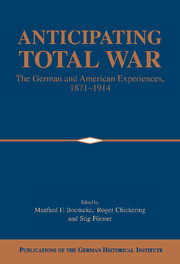Book contents
- Frontmatter
- Introduction
- Part One Germany, The United States, and Total War
- Part Two War and Society
- Part Three Memory and Anticipation: War and Culture
- 11 The American Debate over Modern War, 1871-1914
- 12 Whose War? Whose Nation?: Tensions in the Memory of the Franco-German War of 1870-1871
- 13 War Preparations and National Identity in Imperial Germany
- 14 Military Imagination in the United States, 1815-1917
- 15 Dreams and Nightmares: German Military Leadership and the Images of Future Warfare, 1871-1914
- 16 “A Calamity to Civilization”: Theodore Roosevelt and the Danger of War in Europe
- Part Four The Experience of War
- Index
11 - The American Debate over Modern War, 1871-1914
Published online by Cambridge University Press: 05 January 2013
- Frontmatter
- Introduction
- Part One Germany, The United States, and Total War
- Part Two War and Society
- Part Three Memory and Anticipation: War and Culture
- 11 The American Debate over Modern War, 1871-1914
- 12 Whose War? Whose Nation?: Tensions in the Memory of the Franco-German War of 1870-1871
- 13 War Preparations and National Identity in Imperial Germany
- 14 Military Imagination in the United States, 1815-1917
- 15 Dreams and Nightmares: German Military Leadership and the Images of Future Warfare, 1871-1914
- 16 “A Calamity to Civilization”: Theodore Roosevelt and the Danger of War in Europe
- Part Four The Experience of War
- Index
Summary
“What shall we say of the Great War of Europe, ever threatening, ever impending and which never comes?” an American peace leader asked in 1913. “We shall say that it will never come. Humanly speaking it is impossible.” Because World War I erupted less than a year after David Starr Jordan, the president of Stanford University, made these remarks, they have often been quoted to demonstrate the naivete of prewar peace advocates. Yet they were not all so naive as might appear from this comment. For Jordan had concluded: “Not in the physical sense, of course, for with weak, reckless, and godless men nothing evil is impossible.”
What Jordan was really implying was that war among the major powers might be rendered impossible if the elites and the general public recognized that it would be economically catastrophic and that modern weaponry and mass armies had made modern warfare militarily and politically disastrous as well as inhumane. Jordan was not the only American to make such a prediction, but many others disagreed. In the years before World War I, there was much uncertainty and debate over the evolving nature of modern war, a debate with important ramifications for U.S. foreign policy toward Europe and Asia.
- Type
- Chapter
- Information
- Anticipating Total WarThe German and American Experiences, 1871–1914, pp. 241 - 280Publisher: Cambridge University PressPrint publication year: 1999



